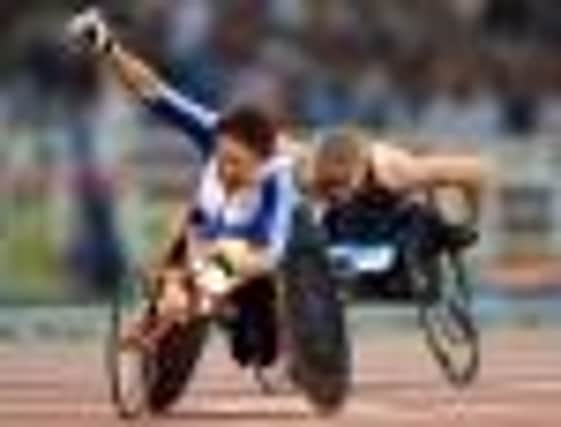Feats of Thompson helped develop ideals of the Paralympics which began in humble surroundings of a veterans’ hospital


The year was 1948 and while the Olympics were contested for a second time in London, just up the road in Buckinghamshire, at Stoke Mandeville Hospital, the very notion of the Paralympics was born in very humble surroundings.
Those first Games for war veterans were contested by 16 ex-servicemen and women with spinal injuries, who took part in an archery competition organised by an innovative German neurologist.
Advertisement
Hide AdAdvertisement
Hide AdSir Ludwig Guttmann believed that sport could play an important role in physical and mental rehabilitation, and as his ideas spread across hospitals, countries and borders, so the Paralympics had lift-off.
The first official Paralympics were held in 1960 in Rome with participation open to more than just the war wounded, though even then, it was still restricted to those in wheelchairs.
Around 400 athletes from 23 countries competed across eight sports, with every athlete guaranteed a medal as there were no more than three individuals or teams in each event.
Great Britain finished second to Italy in the medal table, winning 55 medals, including 15 golds.
Advertisement
Hide AdAdvertisement
Hide AdAmong the champions was Margaret Maughan, who had been a patient at Stoke Mandeville Hospital after a car accident left her paralysed.
She won Britain’s first Paralympic gold medal in archery and went on to take another in swimming as the only competitor in the 50m backstroke race.
Maughan finished her 20-year Paralympic career with four golds in four sports, winning the dartchery (unsurprisingly, a cross between darts and archery) pairs in 1972 in Heidelberg and lawn bowls pairs in Arnhem in 1980.
Weightlifting and wheelchair racing in the form of a 60m dash, were added to the programme in Tokyo in 1964.
Advertisement
Hide AdAdvertisement
Hide AdBut it was not until the 1976 Games in Toronto that athletes with different disabilities took part, with amputee and visually-impaired athletes competing for the first time.
The 1988 Games in Seoul proved another landmark. It was the first time the Paralympics were held in the same venue and using the same facilities as the Olympics, which heralded the dawning of a new modern era for the Games.
Four years earlier, while the Olympic movement was being kick-started into the all-consuming beast it has now become with the first commercially-successful Games of Los Angeles, the Paralympics later that summer were held across two continents.
Stoke Mandeville hosted wheelchair athletes with spinal cord injuries, while across the Atlantic in the Mitchel Athletic Complex and Hofstra University in Long Island, New York, wheelchair and ambulatory athletes with cerebral palsy, amputees, and blind and visually impaired athletes competed for medals.
Advertisement
Hide AdAdvertisement
Hide AdIt was not until television deals were struck to broadcast the Paralympics internationally in 2000, that the Olympics’s younger sibling attracted a global audience.
London 2012 will be the 14th edition of the Paralympics – and quite possibly the best yet – with more than 4,000 dedicated athletes competing over 503 events in 21 sports.
The biggest names in Paralympic sport have become global stars, with amputee sprinter Oscar Pistorius admired the world over for breaking barriers, while American swimmer Trischa Zorn, who was blind from birth, has amassed a staggering 55 medals, including 41 golds.
Great Britain has its own Paralympic superstar, Dame Tanni Grey-Thompson.
Advertisement
Hide AdAdvertisement
Hide AdOver five Games from Seoul in 1988 to Athens in 2004 the wheelchair sprinter won 16 medals, including 11 golds.
Thompson won the Paralympic 800m title in three successive Games from Barcelona to Sydney.
Away from the Games, she won the London Marathon six times in an 11-year period around the turn of the century. Thompson was a sporting star who has done more than anyone in this country to raise the profile of Paralympic sports and disabled athletes.
The young woman who hopes to begin her own chapter of dominance in wheelchair sprinting is Halifax’s Hannah Cockroft, who was the first athlete to break a world record in the Olympic Stadium in May.
Advertisement
Hide AdAdvertisement
Hide AdCockroft, 20, suffers from cerebral palsy. She is the world champion in the T34 category 100m and 200m sprinting and over the next fortnight hopes to carve her name into the ever-expanding tapestry of the Paralympic Games.
From humble beginnings in a British hospital to 2.2 million tickets sold, the Paralympics is for ever developing.